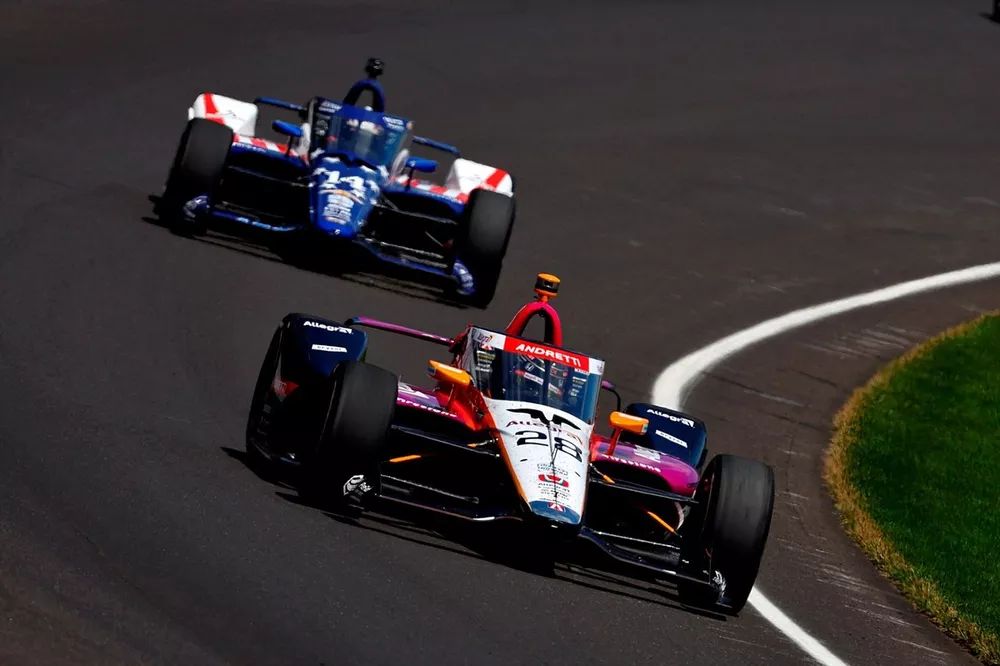Introduction
The 109th running of the Indianapolis 500, held on May 25, 2025, was a spectacle of speed, strategy, and heartbreak, culminating in Alex Palou’s historic victory as the first driver since A.J. Foyt in 1979 to win five of the first six IndyCar races in a season. However, the post-race narrative shifted dramatically from celebration to controversy when IndyCar announced severe penalties for three cars—two from Andretti Global and one from Prema Racing—due to technical violations discovered during post-race inspections. Marcus Ericsson, Kyle Kirkwood, and Callum Ilott, who initially finished second, sixth, and twelfth respectively, were relegated to the bottom of the 33-car field, fined $100,000 each, and their teams’ competition managers faced one-race suspensions. This article delves into the details of these violations, their implications for the teams, drivers, and the IndyCar Series, and the broader context of integrity in motorsport.
The Violations: What Went Wrong?
Post-race technical inspections are a cornerstone of IndyCar’s commitment to ensuring a level playing field. Following the 2025 Indianapolis 500, IndyCar’s technical team identified infractions on the No. 27 and No. 28 Andretti Global Hondas driven by Kyle Kirkwood and Marcus Ericsson, respectively, and the No. 90 Prema Racing Chevrolet driven by Callum Ilott. The violations were distinct but significant, leading to identical penalties for all three entries.
Andretti Global’s Infractions
The Andretti Global cars were found to have modified the Dallara-supplied Energy Management System (EMS) covers and cover-to-A-arm mounting points with unapproved spacers and parts. According to IndyCar, these modifications “provided the capability of enhanced aerodynamic efficiency,” potentially giving the cars an unfair advantage on the 2.5-mile Indianapolis Motor Speedway oval. The EMS, part of IndyCar’s hybrid system introduced to enhance performance and sustainability, is a standardized component supplied by Dallara, the series’ chassis manufacturer. Altering such components violates IndyCar’s strict rules against modifying spec parts, which are designed to ensure fairness and safety across the field.
Prema Racing’s Violation
Prema Racing’s No. 90 car, driven by Callum Ilott, failed to meet the minimum endplate height and location specifications for its front wing assembly. This infraction, while different from Andretti’s, was equally serious, as the front wing plays a critical role in aerodynamic performance, particularly at high-speed tracks like Indianapolis. IndyCar’s regulations specify precise measurements for wing components to prevent teams from gaining an aerodynamic edge through non-compliant configurations.
Penalties Imposed
The penalties were swift and severe. IndyCar disqualified all three cars from their original finishing positions, reordering them to 31st (Ericsson), 32nd (Kirkwood), and 33rd (Ilott) in the official standings, based on their running order at the race’s conclusion. Each team was fined $100,000, and their competition managers were suspended for the next IndyCar event, the Detroit Grand Prix. Additionally, the teams forfeited their race earnings and championship points associated with their original finishes, a significant financial and competitive blow given the Indy 500’s record $20.283 million purse, with the winner, Alex Palou, earning $3.8 million.
The Impact on Teams and Drivers
Andretti Global: A Costly Setback
For Andretti Global, the penalties were particularly devastating. Marcus Ericsson, who led late in the race and finished just behind Palou, saw his second-place finish—a potential career-defining moment—erased. Ericsson, a former Indy 500 winner (2022), expressed heartbreak over losing the lead with 13 laps to go, and the disqualification added insult to injury. Kyle Kirkwood, who had celebrated a sixth-place finish, was similarly relegated, compounding the team’s woes. Andretti Global issued a statement acknowledging receipt of IndyCar’s penalty notice and announced their intent to request a full review of the decision, signaling potential disagreement with the severity or interpretation of the violations.
The financial impact cannot be overstated. The loss of prize money for second and sixth places, combined with the $100,000 fines for each car, represents a significant hit to Andretti Global’s budget. Moreover, the one-race suspension of their competition managers could disrupt team operations at the upcoming Detroit race, a challenging street circuit where strategic decisions are critical.
This incident also adds another chapter to the so-called “Andretti curse” at Indianapolis, a narrative referencing the Andretti family’s long history of near-misses and misfortunes at the Indy 500 despite their storied legacy. Marco Andretti, another Andretti Global driver, crashed out on Lap 4 of the 2025 race, further underscoring the team’s struggles. The technical violations now cast a shadow over Andretti Global’s reputation, raising questions about their engineering practices and compliance culture.
Prema Racing: A Rookie Setback
Prema Racing, a newcomer to IndyCar but a powerhouse in European motorsport, faced a similar blow with Callum Ilott’s disqualification. Prema had already made headlines with Robert Shwartzman’s shock pole position, a remarkable achievement for a team in its debut Indy 500. However, Ilott’s 12th-place finish was nullified, and the team’s $100,000 fine and managerial suspension add pressure to an organization still establishing itself in the series. Unlike Andretti Global, Prema has not yet issued a public statement regarding the penalties, leaving their response to the situation unclear at this time.
For Ilott, the penalty is a personal setback. As a driver building his IndyCar career, losing a solid midfield finish in “The Greatest Spectacle in Racing” diminishes his points tally and visibility. Prema’s technical infraction, while seemingly less intentional than Andretti’s modifications, underscores the steep learning curve for teams transitioning from other racing series to IndyCar’s highly regulated environment.
IndyCar’s Response: A Stand for Integrity
IndyCar President J. Douglas Boles emphasized the importance of maintaining the series’ integrity, stating, “The integrity of the Indianapolis 500 is paramount, and this violation of the IndyCar rule against modification to this part and using it ‘as supplied’ is clear.” Boles highlighted the positive momentum surrounding the 2025 Indy 500, which drew 7.05 million viewers on Fox, and stressed IndyCar’s commitment to ensuring fair competition. The decision to impose penalties harsher than the rulebook’s minimum—such as reordering the cars to the back of the field rather than allowing them to retain qualified positions—reflects IndyCar’s intent to deter future violations.
The suspensions of competition managers, a relatively rare penalty, signal IndyCar’s focus on holding team leadership accountable. By targeting strategists and managers, IndyCar aims to discourage teams from pushing the boundaries of technical regulations, particularly in high-stakes events like the Indy 500.
Contextualizing the Controversy
This incident is not an isolated one in IndyCar’s recent history. Just a week before the 2025 Indy 500, Team Penske faced penalties for modifying attenuators on the cars of Josef Newgarden and Will Power, sending them to the back of the starting grid and fining each entry $100,000. The Penske violations, coupled with a 2024 push-to-pass scandal that cost Newgarden a win, have fueled discussions about the prevalence of technical infractions in IndyCar. The Andretti and Prema penalties further amplify these concerns, prompting scrutiny of the series’ inspection processes and the incentives driving teams to skirt regulations.
Critics argue that IndyCar’s post-race inspections, while rigorous, may not be catching violations early enough. The fact that Andretti’s modified EMS covers and Prema’s non-compliant wing went undetected until after the race raises questions about pre-race and qualifying inspections. Teams regularly undergo checks before and during race weekends, yet these infractions slipped through, suggesting potential gaps in the process. However, IndyCar’s swift response demonstrates a commitment to addressing violations when discovered, even at the cost of altering high-profile results.
The Broader Implications
The penalties have sparked debate about fairness, compliance, and the culture of innovation in motorsport. Teams like Andretti Global and Prema Racing operate in a hyper-competitive environment where fractions of a second can determine victory. The temptation to explore gray areas in the rulebook is ever-present, particularly in a series like IndyCar, where spec components limit opportunities for differentiation. However, IndyCar’s strict enforcement underscores the risks of such experimentation, especially when it compromises the series’ integrity.
For Andretti Global, the incident could strain relationships with sponsors and fans, who expect transparency and success from a team with such a storied name. The request for a review suggests Andretti believes there may be grounds for appeal, possibly arguing that the modifications were unintentional or did not provide a significant advantage. However, IndyCar’s detailed findings—specifically the aerodynamic benefits of the EMS modifications—make a successful appeal unlikely unless new evidence emerges.
Prema Racing, as a newcomer, faces a different challenge. The team’s European pedigree, built on success in Formula 2 and other series, does not exempt it from IndyCar’s stringent regulations. This incident may prompt Prema to reassess its technical processes, particularly as it aims to establish a foothold in American open-wheel racing.
The Drivers’ Perspective
For Marcus Ericsson, Kyle Kirkwood, and Callum Ilott, the penalties are a bitter pill. Drivers rely on their teams to ensure compliance, and while they are not personally fined or suspended, the loss of finishing positions and points affects their championship standings and reputations. Ericsson, in particular, has been vocal about the emotional toll of the Indy 500, describing it as “more than just a race.” The disqualification adds to his disappointment after a strong performance.
Kirkwood, who celebrated a win at Long Beach earlier in the season, now faces the challenge of rebounding from this setback. Ilott, meanwhile, must navigate the fallout as a driver still proving his worth in IndyCar. The suspensions of their competition managers could further complicate their preparations for Detroit, where team cohesion will be tested.
Looking Ahead
As IndyCar moves to the Detroit Grand Prix, the focus will shift from the Indy 500’s drama to the next chapter of the 2025 season. Andretti Global and Prema Racing will need to regroup, both operationally and strategically, to mitigate the impact of the suspensions and fines. IndyCar, meanwhile, must balance its enforcement of rules with the need to maintain fan and sponsor confidence. The series’ transparency in addressing violations is commendable, but recurring scandals—first Penske, now Andretti and Prema—suggest a need for enhanced pre-race inspections to prevent such controversies.
The 2025 Indy 500 will be remembered not only for Palou’s dominance but also for the technical violations that reshaped its results. For Andretti Global and Prema Racing, the penalties serve as a costly reminder of the fine line between innovation and infraction in motorsport. As the racing community reflects on this incident, the spotlight remains on IndyCar’s ability to uphold fairness while fostering competition at the highest level.
Conclusion
The disqualifications of Marcus Ericsson, Kyle Kirkwood, and Callum Ilott at the 2025 Indianapolis 500 underscore the high stakes of technical compliance in IndyCar. Andretti Global and Prema Racing now face financial, competitive, and reputational challenges as they navigate the fallout. IndyCar’s decisive action reinforces its commitment to integrity, but the recurrence of such incidents highlights the ongoing tension between innovation and regulation in motorsport. As the series moves forward, all eyes will be on how teams adapt and whether IndyCar can strengthen its processes to ensure “the best win under completely fair conditions,” as Boles vowed.


